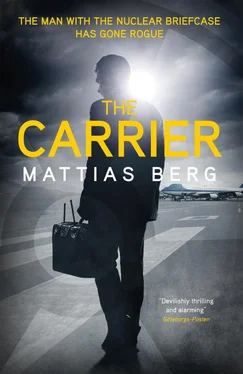Mattias Berg - The Carrier
Здесь есть возможность читать онлайн «Mattias Berg - The Carrier» весь текст электронной книги совершенно бесплатно (целиком полную версию без сокращений). В некоторых случаях можно слушать аудио, скачать через торрент в формате fb2 и присутствует краткое содержание. Город: London, Год выпуска: 2019, ISBN: 2019, Издательство: MacLehose Press, Жанр: Триллер, на английском языке. Описание произведения, (предисловие) а так же отзывы посетителей доступны на портале библиотеки ЛибКат.
- Название:The Carrier
- Автор:
- Издательство:MacLehose Press
- Жанр:
- Год:2019
- Город:London
- ISBN:978-0-85705-788-4
- Рейтинг книги:4 / 5. Голосов: 1
-
Избранное:Добавить в избранное
- Отзывы:
-
Ваша оценка:
- 80
- 1
- 2
- 3
- 4
- 5
The Carrier: краткое содержание, описание и аннотация
Предлагаем к чтению аннотацию, описание, краткое содержание или предисловие (зависит от того, что написал сам автор книги «The Carrier»). Если вы не нашли необходимую информацию о книге — напишите в комментариях, мы постараемся отыскать её.
The Carrier — читать онлайн бесплатно полную книгу (весь текст) целиком
Ниже представлен текст книги, разбитый по страницам. Система сохранения места последней прочитанной страницы, позволяет с удобством читать онлайн бесплатно книгу «The Carrier», без необходимости каждый раз заново искать на чём Вы остановились. Поставьте закладку, и сможете в любой момент перейти на страницу, на которой закончили чтение.
Интервал:
Закладка:
When the clock radio showed 17.00, I switched on the T.V. It was the guards who reminded me because I had lost all sense of time. As the camera swept over the auditorium of the World Forum of Nuclear Weapons Security at The Hague, I could still identify almost all of the ministers, doubles and agents. As well as the “Carriers” of all of the nuclear weapons nations—with their briefcases and professionally neutral expressions: the seven official states’ holders of their secrets, codes and rituals.
The red wine was excellent, as was the beef filet, even if I had left the plate standing for an hour or so on the desk under the T.V. I ate slowly, chewed the meat thoroughly. Really tried to savor my last hour. Observed the new Carrier’s motionless face a foot or so behind the President: the culmination of what had been the Team’s “Revitalization”.
Proof of the fact that they had achieved the improbable feat of persuading the decision makers, the very few who were sufficiently in the know, that it really was worth continuing with an asymmetrical little unit like this to carry out asymmetrical warfare. That it was precisely this that had saved mankind on this occasion—skillfully pursuing two defectors, following them all the way into the heart of the conspiracy that had being going on for decades, and which all the others had failed to uncover, all these cherished institutions like the C.I.A., the F.B.I., the N.S.A. and the Secret Service.
That unthinkable strategies could only be revealed by unthinkable structures. That the nuclear weapons system had to be defended with the same conceptual madness that created it.
After the President’s formal speech—his constant assurances that a nuclear weapons-free world was the only conceivable solution—I rose to turn off the T.V. Knew that this was what they had wanted to demonstrate. How the show kept rolling on at the nuclear weapons summit, as if nothing at all had happened, while the rest of the world remained in ignorance of the flight and pursuit—as well as the capture. How not even Ingrid and I had been able to make any difference.
But up close to the T.V., I froze. Suddenly I recognized our new Carrier. The same woman I had seen with Sixten in Ursvik, briefly, but long enough for her image to linger. The same guard who took us to Edelweiss’ office at Dulles airport. Her appraising ice-blue gaze in the Interview Room, her supple way of moving with the briefcase a couple of meters behind the President on their way out from the Nuclear Weapons Security Forum. It must be Lisa, Sixten’s daughter. Ingrid’s daughter.
I knocked back the rest of the wine. Thoughts whirled around in my mind. About who I was, about Ingrid, my mother, Lisa… This entire tapestry of deception. Who I might once have been. How I had then become somebody entirely different, if Ingrid was ever to be believed. With that lover and that daughter…
I tried once more to gather my memories, get them in some semblance of order. The scene at the breakfast table with my mother and the thirteen-year-old who might have been me, her despair, my way of trying to get her to think of something else, the book cipher as distraction, that strange key sentence which had welled up from the darkness inside me. Had this really happened? Could something so real simply never have existed? I tried as best I could to recall what had been said during my and Ingrid’s endless sessions on the dissertation, images which were both seared into my mind and faded. My early days at university—how I had been picked up by the recruiters, chosen for special services or the missile forces, at the same time as I threw myself headlong into Ingrid Bergman’s moral philosophy lectures.
I grimaced, frowned, scribbled fragments of recollections on the back of the last pages in my account for Edelweiss. My witness statement. Myself as example, held up as a warning to posterity.
Once Edelweiss had it, my report of what can happen when two sufficiently dedicated people make common cause, he would destroy it or bury it in some obscure military archive. And as soon as he was pensioned off, if not before, the next person in charge would look at this little notebook as some kind of refuse from the past. When a new special team would have been in existence for a long time, called NUCLEUS II or something of that sort, and the “Revitalization” would have left our nuclear weapons system bigger and more powerful than ever. Long after Ingrid and I had been erased.
When they opened the door, the line-up was as I had expected. Two groups of guards, four thugs in each. One outside my cell, one outside Ingrid’s about fifteen feet away. Her group of guards led by Zafirah, mine by our close combat instructor from Rwanda: with the burns still as a macabre memento from the battle with Ingrid at the M.U.O.S. base. I got to my feet, pushed the notebook into the left-hand thigh pocket of my combat pants, to be delivered to Edelweiss as my last act. Walked through my cell door.
For a moment we stood there like that, both groups. I glanced back at Ingrid. The dark star that had guided me through so much of my life. As impossible to resist as to do her bidding. She who had deceived and transformed me, for good or ill, bewitched me until I no longer had any grasp on who was her and who me. Stately, broad-shouldered, proud and majestic, like Greta Garbo. Like Mata Hari in the movie, on her way to face the firing squad—with no regrets for what she had done.
I had wondered why the director had not used that quotation as a dramatic ending. If, that is, the Dutch dancer and double agent had in fact spoken those words when she was taken from her cell.
But Ingrid used it now.
“I am ready.”
The guards did not react to what appeared to be a gesture of submission, a final acceptance. Their expressions remained blank, they stood immobile, waiting. Even our Close Combat instructor in front of me. Zafirah alone tensed her body, but did not make any move, waiting for orders through her earpiece from Edelweiss.
“Farewell, Ingrid. It always was we two against the world,” I said.
She did not answer directly, but continued with the last part of the trigger command, apparently so harmless:
“Are you ready, Erasmus?”
8
End Run
April 2014
Greenland
8.01
Of the ultra-violence which followed that trigger, I have only sporadic memory.
I know this: I would not have managed my escape without Ingrid. She attacked Zafirah without warning, a diversion so that my sister-in-arms from Afghanistan did not anticipate the stab—swift, sharp—into her eyes, my fingers through the orbital socket to the soft tissue of her brain. The shock of slaughter, of the Team’s most violent fighter, before the killing had even begun, disarming the guards. Even the Rwandan combat instructor, who must not have recovered fully after the defeat at Niscemi. Between us, Ingrid and I erased or maimed—hard to know in the frenzy—them all. Broke out to the corridors and the two armed guards along the way, where—this I believe—Ingrid sacrificed herself as a parting gift to me. Distraction as art. Her action for my freedom. Her line of defense, drawing fire, permitting my exit into the surrounding streets.
Memory returns. I was hidden for some precious hours by local tradesmen, bitter opponents of the Niscemi base. Within their network, they organized my place on a fishing boat and away from Italy. From there, bound for Copenhagen, I hid on a large cargo vessel, then smaller boats, the last an icebreaker with only the most basic storage. Finding or stealing what I needed as I traveled north.
It was not difficult to bypass the checks in Thule harbor, under cover of the crowds that gather when the first ships arrive with packages and the mail after long winter months. All this yearning for home. People in environments for which they were not intended.
Читать дальшеИнтервал:
Закладка:
Похожие книги на «The Carrier»
Представляем Вашему вниманию похожие книги на «The Carrier» списком для выбора. Мы отобрали схожую по названию и смыслу литературу в надежде предоставить читателям больше вариантов отыскать новые, интересные, ещё непрочитанные произведения.
Обсуждение, отзывы о книге «The Carrier» и просто собственные мнения читателей. Оставьте ваши комментарии, напишите, что Вы думаете о произведении, его смысле или главных героях. Укажите что конкретно понравилось, а что нет, и почему Вы так считаете.












